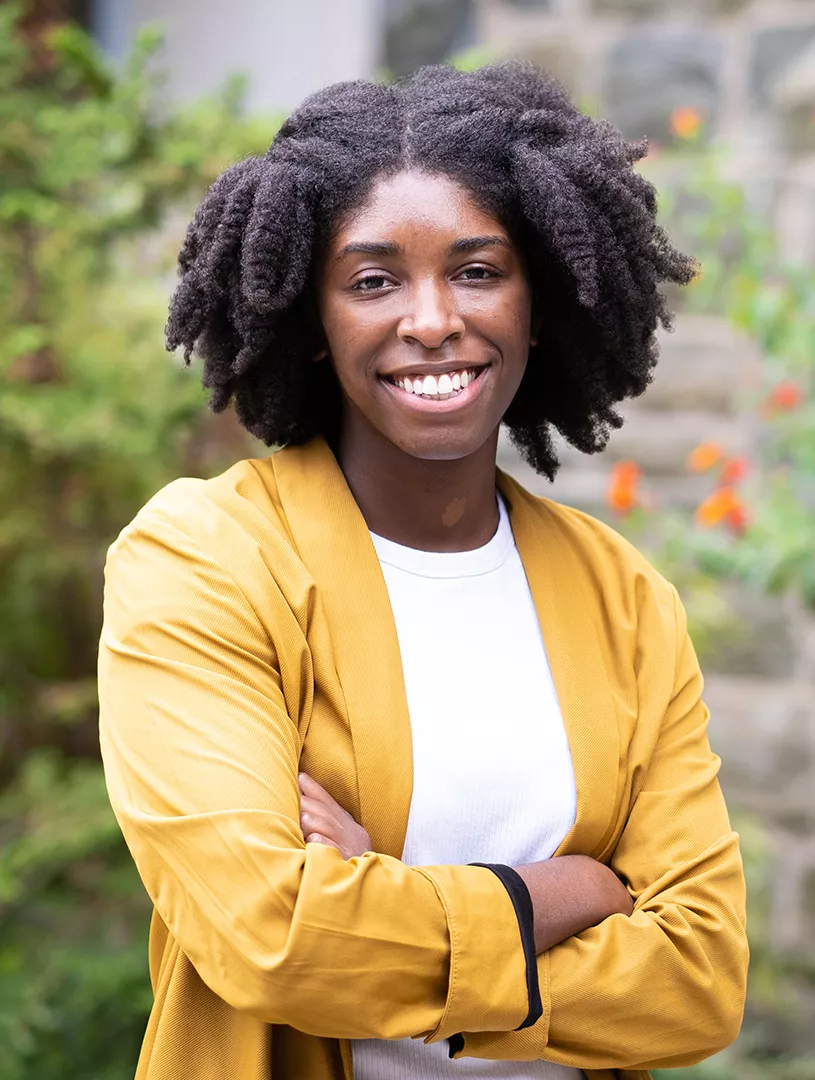
Joi Dallas is the new Assistant Dean for Intercultural Engagement at Bryn Mawr. After a two-year stint as Residential Life Coordinator, working both with hall advisors throughout the dorms and with the Enid Cook '31 Center, she now joins the Pensby Center for Community Development and Inclusion staff. Students know her for her enthusiasm and her unending kindness.
You've been at Bryn Mawr for a few years now. Can you tell me about your former role at the College?
Previously, I had the pleasure of serving as one of two Residential Life Coordinators. The residential aspect of the College is really special to me and I loved working with the Reslife team. As an RLC I helped supervise a number of hall advisors, meeting with a group weekly and doing one-on-one's throughout the semester. The other part of my job involved supporting the various student leaders involved with the Enid Cook ‘31 Center (ECC), including the dorm presidents, the DLT, and affiliated AMO eboards. The ECC is such a big part of a lot of students' lives and it’s funny to think that it’s really not that old—only six years. There were a lot of processes and traditions that needed to be developed and built up. It was such a pleasure thinking through what the students wanted the ECC to be and helping it become reality.
How is this new role different?
This new role is an expansion of the ECC aspect of my old role. It became clear to students in the few years that the ECC had an RLC advisor that they needed a fully dedicated staff person to support the growing community. The community building events, such as Legacy Day, are much bigger than ever before and AMOs, like Sisterhood* for example, are organizing campus-wide programming on a much broader scale than in the past. Students shouldn’t have to figure everything out and do it all themselves. They deserve a full-time support person. Additionally, this role is a part of Pensby now and that means I am getting involved with a number of initiatives that the RLC role would not have. I will be helping to organize DEIAB trainings for students and employees, facilitating dialogue between students at group meetings, and working more closely with the whole of students’ support networks including their families, deans, and professors.
What kind of collaboration are you planning with other offices, academic departments, and student groups?
I will definitely be collaborating with the ECC’s four affiliated AMO groups (Sisterhood*, BACaSO, Mujeres*, and Zami+), but I hope to act as a resource for any student group that desires support around creating an inclusive environment for their members and event participants. I will continue to collaborate with LITS and Alumnae/i Relations and Development on the Preserving the Histories of Perry House Project, which is in its second year. That project is so exciting to me because it connects the stories of community members from the old Black cultural center, Perry House, with the experiences of current ECC community members. I will also continue working with the Counseling Center and the Career & Civic Engagement Center on projects such as Breathing Space, the regular talk space for Black students. I’ve begun receiving invitations to collaborate with faculty members on speaker series and I’m very excited to begin that work.
What are some things you're most excited about as we enter the new academic year?
I’m most excited to see all the different ways students will help steer the ship, so to speak, when it comes to the College fulfilling its commitments outlined in response to the Strike of 2020. I’m excited that the ECC has two paid student coordinators who will help ensure the growing community is well supported and well celebrated. Lastly, I’m excited to hopefully be able to incorporate food into cultural events again. Having access to traditional foods is something that sounds so small, but can make a big difference for students struggling to make a home at Bryn Mawr. There are spices from all over the world in the ECC kitchen that went unused last year! I hope to provide opportunities for students to cook together and be in community in this way this year.
What did you do prior to coming to Bryn Mawr? How have you been able to draw on your past experiences in your work here?
Prior to Bryn Mawr, I worked as a grad assistant in the Center for Student Formation (CSF) at Boston College while pursuing a master's degree in school counseling. At CSF I helped develop curriculum for reflection retreats and mentorship programs for students of color. I organized these experiences, recruited student leaders and participants, and hosted the events. Working in an office whose mission was to create opportunities for deep, personal reflection helped me transition smoothly to a place like Bryn Mawr where community members are not afraid to challenge each other to be more thoughtful. I also draw on my training as a guidance counselor whenever students come to me for emotional support or when they are in need of a good thought partner.
What do you like to do outside of Bryn Mawr?
Outside of Bryn Mawr, I like to go on group nature walks at the many large parks Philadelphia has. I’ve been known to take some snacks and my current book to Belmont Plateau and spend the afternoon. There are always free events, like poetry readings and craft fairs, happening around the city and I like to use those as a way to explore new neighborhoods. My absolute favorite brunch spot is Cafe La Maude in Northern Liberties.
The Pensby Center for Diversity and Inclusion offers a number of programs and opportunities for learning, supporting community outreach programs such as the Community Diversity Assistants and Black at Bryn Mawr.